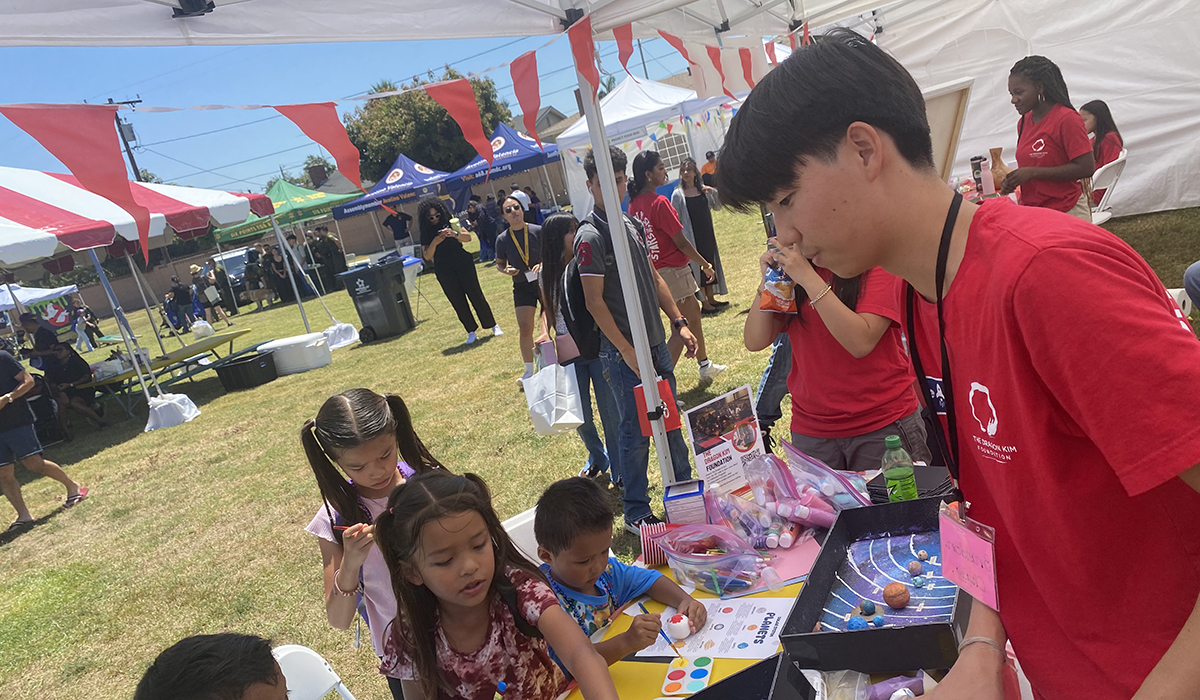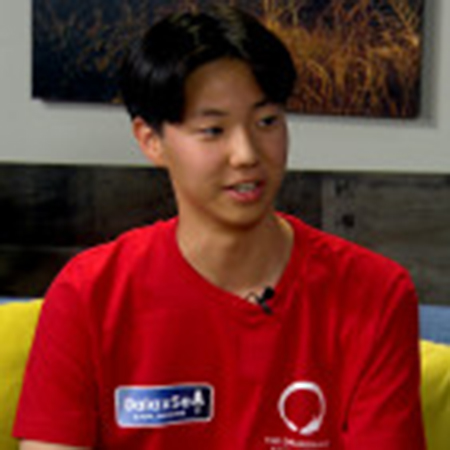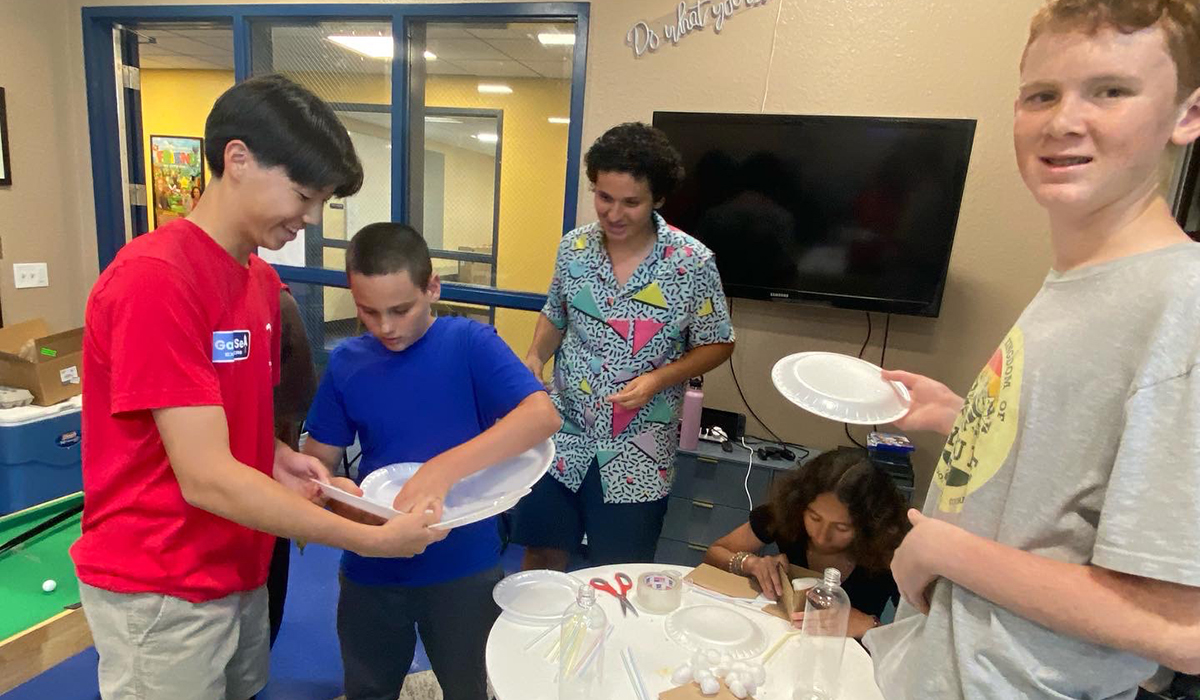Reaching for the Stars: Making Space Education a Universal Right

Meet Daily Point of Light Award honoree Brandon Chang. Read his story, and nominate an outstanding volunteer or family as a Daily Point of Light.
A fire was lit under Brandon Chang in middle school – a defining moment that transformed a fleeting frustration into a lifelong mission. When a STEM staff member dismissively suggested he “pick a more stable career” than one in space, Brandon didn’t just walk away; he came home furious and declared his ambition to bring space education to every school. That audacious goal was the genesis of GalaxSea Explorers, an organization he founded to ensure no other student felt deterred from their dream to work in space. Now, his passion project has grown into a powerful network of several hundred supporters, achieving an astounding impact on 262,000 individuals with just $17,000 in seed funding.
GalaxSea Explorers’ programming goes far beyond textbook technical skills. While its flagship weeklong summer camps, workshops and popular Space DIY Kits (the next iteration of which Brandon is currently developing) provide tangible ways to engage with astronomy, the organization also focuses on broader life skills. Subinitiatives dedicated to soft skill growth, such as public speaking and budgeting, ensure that students are prepared for any career path, not just one in aerospace. Brandon is also currently overseeing the international chapters’ first long-form camps and designing new curriculum content, putting in 20 to 40+ hours a month of active volunteer time. His commitment to inclusivity is further evidenced by the upcoming Girls in Space program, ensuring everyone gets to dream big about a future among the stars.

Brandon’s daily duties demonstrate his dedication to the cause, extending to everything from curriculum design to developing improved versions of their video tutorials and the organization’s accessible one-pagers and in-class educational materials. His biggest accomplishment for 2025 has been standardizing the central curriculum used across all GalaxSea Explorers programming. He’s now looking ahead, with plans in early 2026 to distribute this standardized curriculum to educators and districts throughout California and beyond.
As he spreads the hopeful message of an internationally unified effort in space, his work has earned him significant recognition from institutions like the Princeton Prize, and major media outlets, including CBS and The Kelly Clarkson Show. His hopeful mission is clear: to make the vast expanse of space an accessible, achievable future for all.
Tell us about your volunteer role.
As the founder of GalaxSea Explorers, my role spans from designing summer camp curricula to filming silly YouTube videos to reach students from regions we cannot physically hold programs at. On the ground, I lead free astronomy and space science programs for students in grades K–12 with a focus on Title I schools and under-resourced communities. I hand-pack and distribute educational space kits, run workshops that connect scientific ideas to hands-on experiments and work directly with teachers, administrators and local and state-level policymakers to bring our programs into classrooms.
Beyond teaching, I coordinate outreach logistics, manage a team of passionate volunteers and build partnerships with nonprofits and industry leaders in the private space sector to expand our impact. I also oversee content creation and curriculum development for several of our international chapters, making sure our materials stay engaging, accurate, high-quality and accessible to students who might otherwise have limited exposure to STEM.
Why is this issue so important to you?
As someone absolutely fascinated by all of aerospace engineering and astronomy’s unsolved questions, the concerning levels of educational inequality that persist to this day hits very close to home. Growing up, I noticed far too often that students – myself included – were being indirectly told that such “nonessential” areas of study were unfeasible pathways. However, noticing the importance of self-belief just as much as the education, I am proud to be able to redefine what space exploration means for the rising generation of future astronauts and aerospace engineers. I believe space to be the epitome of childhood creativity, and even if students might not ultimately end up pursuing the field, limiting their access to it directly stifles their ability and desire to imagine.
What inspired you to get started with this initiative?
Having been raised in a low-income, single-parent household, I have direct experiences of barriers surrounding space education and access to learning opportunities as a whole. Upon seeing that only 11% of high schools offer any space related coursework and that the void is particularly pervasive in low-income communities, I created GalaxSea Explorers so that no child’s ability to dream of pursuing this field is limited due to their zip code or family situation.
What are your long-term plans or goals with the organization?
By late 2026 or early 2027, I hope to expand GalaxSea Explorers to all 50 states, while launching specialized subprograms like “Girls in Space” and expanding internationally to Malawi. In the long-term, by staying involved as a board member after going to college, I hope to implement math modeling techniques to break ground in the statistical research of space education, particularly its concentration patterns. Establishing data-driven research models for BIPOC education and transitioning from temporary camps to permanent institutional reform, I hope to blend curriculum with advocacy in creating change that lasts beyond GalaxSea Explorers’ lifetime.
What’s the most rewarding part of your work?
Seeing the unrestrained joy on kids’ faces… whether it’s the 10 seconds before bottle rockets blast up, the moment a student finishes the Mars crossword puzzle from my K-2nd grade curriculum, or a girl telling me “Get my autograph, I’m going to be the first Asian woman on Mars!”… the sheer excitement that education can bring inspires me to come up with more of such experiences. I’ve had the distinct honor of witnessing a failed solar system model reshaping a student’s career path or an IEP student taking the lead for the first time in school – seeing those individual transformations with my own eyes is most rewarding.

What have you learned through your experiences volunteering?
Ironically, even in my role as teacher, I myself have gained tons of additional astronomy knowledge, whether by reviewing past concepts or finding exciting new advancements to share with students. Further, I’ve grown as an educator, practicing the ability to develop lasting engagement even beyond the limited time we have with students. Lastly, I’ve learned to embrace flexibility in education, knowing when to creatively adapt to unexpected scenarios (especially considering we work with kids most of the time) rather than rigidly sticking minute-by-minute to the pre-planned schedule.
Why is it important for youth to get involved with causes they care about?
When we all begin expecting the person next to us to step up for issues we personally care about, everyone becomes a bystander. Voicing concerns with the unique worldview you bring leaves much greater impact than simply borrowing others’ voices. By choosing to become deeply involved in service as a whole, I’ve personally gained immense insight into the underlying systematic barriers to education that aren’t easily seen from the surface. I’ve gained more from service than I’ve given. I’m a strong believer in the notion that by serving actively, not vicariously, volunteers experience the irreplaceable satisfaction of changing someone’s day – or life – no matter how small.
Any advice for people who want to start volunteering?
Don’t look for excuses to wait until later, look for reasons to start today. Staying proactive has opened GalaxSea Explorers up to so many unexpected opportunities that have become a fundamental part of who we. Secondly, while daunting challenges are more common than progress in the world of service, remember that any volunteering work – no matter how small – has the power to influence those around you. We just choose the kind of influence we want to leave.
Do you want to make a difference in your community like Brandon? Find local volunteer opportunities.